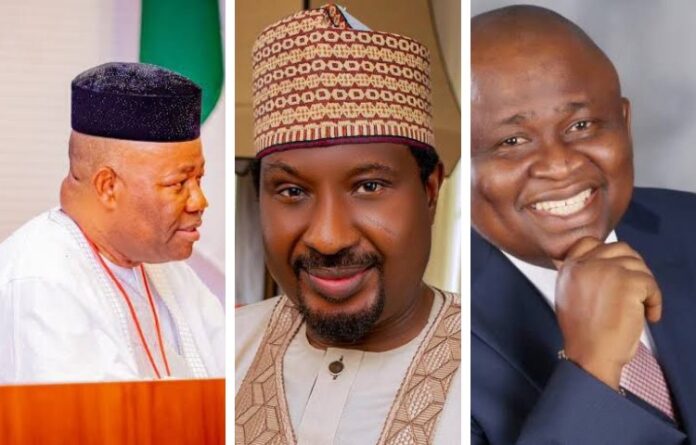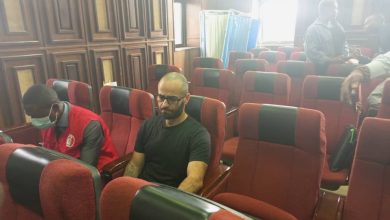How NASS leadership ‘hijacked’ 2022 supplementary budget

In December 2022, under Muhammadu Buhari’s Administration, a supplementary budget of N819.5bn was passed by the 9th Assembly to address the aftermath of the year’s flooding and to complete other crucial projects. The budget was for four MDAs – Works & Housing, Water Resources, FCTA and Finance. However, after subsidy removal in 2023, the 10th assembly, upon President Bola Tinubu’s request, reviewed the 2022 supplementary budget to reallocate N500bn for palliative.
This was not all they did, as the ICIR’s investigation reveals the new leadership of the National Assembly, including the Senate President Godswill Akpabio, his deputy, Barau Jibrin, and the Senate Appropriation Chairman, Solomon Adeola (also known as Yayi), diverted over N20 billion in projects to their constituencies, resources that should have gone into solving flooding problems in other places. This was aside from the N70 billion approved budget for the National Assembly.
Our source reports that around N110.23 billion was earmarked in the supplementary budget for flood prevention projects and related road projects within the Federal Ministry of Works and Housing (FMWH), while several other projects across the Ministry of Finance, Budget and Planning; Water Resources; and Federal Capital Territory collectively received the highest share of the budget.
READ ALSO: Tinubu signs N2.17trn supplementary budget
The 2022 flooding, which affected 35 states and the FCT, destroyed scores of houses, thousands of hectares of farmlands, infrastructure, and roads. Beyond the infrastructural damages, about 662 persons lost their lives, 3,174 suffered injuries, and 2,430,445 individuals were displaced, with a total estimated loss due to flooding amounting to N4.2 trillion, according to the former Minister of Finance, Ahmed Zainab.
Meanwhile, after the emergence of Tinubu as the president, the senate leadership hid under the amendment of the 2022 Supplementary Appropriation Act sent by the president to pad the budget by over 20 billion.
Tinubu, in his letter to the National Assembly, said the amendment was to allow the Federal Government to source N500 billion from the N819.5 billion 2022 supplementary budget. This, according to Tinubu, was to cushion the effect of subsidy removal following his declaration that his administration would no longer pay fuel subsidy.

However, while passing the amendment supplementary budget, the senate also approved N70 billion for the 469 federal lawmakers for improved working conditions and another N30 billion for the National Judicial Council (NJC), among others.
Agricultural allocation reduced from N69.2 bn to N200m, 18 new projects inserted
Our source gathered that in the original supplementary budget, exclusively earmarked for four ministries, N69.2 billion was allocated to the Ministry of Agriculture. However, after the budget amendment, the money was reduced to 200 million.
Still exercising their power over the budget document, the lawmakers inserted 18 projects, amounting to N19 billion, into the Ministry of Agriculture and Rural Development (MDAs) budget. This brought the total amount to N19.2 billion.
Out of the total 19.2 billion allocated to the Agriculture Ministry as amended, only N200 million was allocated to the listed projects that comprised the initial 69.2 billion, while the remaining 19 billion was earmarked for new projects championed by influential figures within the senate.
Accordingly, the Federal Government, through the Ministry of Finance, ordered the release of the total supplementary budget of N819.5 billion to the seven (7) MDAs.
In a letter dated September 29, 2023, the Ministry, through the Deputy Director of Cash Management Department and the Permanent Secretary Special (PSSD), sought approval from the Finance Minister to release the funds to the beneficiary MDAs.

Five new projects to Yayi’s constituency
While reviewing the document obtained by The ICIR, it was discovered that 18 additional projects, amounting to N19 billion, were inserted by the lawmakers out of which five were nominated by Senator Yayi. Most of the projects are to be executed in his constituency, Ogun West Senatorial District.
The five projects amount to N4 billion of the N19 billion additional budget are:
1. Construction of Edi Road, Sabo market and Ilaro township road, Yewa south
2. Construction of roads in Imeko, Afoniwye and Obada
3. Construction of Ilashe-Agbara road
4. Construction of market square-fadama ring road
5. Construction of police barrack, old baggage link road Ode Ogun
However, aside from the projects not being directly related to flood projects as read by the senate when passing the bill, Ogun State was not among the top 30 of the most hit states with flooding in 2022.
States such as Bayelsa, Anambra, Kwara, Nasarawa, Adamawa and Jigawa, which are some of the most devastated by the flooding and thus needed the most assistance, either saw their budget reduced significantly or excluded completely.
Reacting to Our source findings, Yayi’s Media Aide, Kayode Odunaro, argued that the senator is not part of the senate’s leadership and, thus, does not have the power to influence the budget to favour his constituency. Yayi was, however the Senate appropriations chairman.
“A budget passed through several stages before it was now passed, and it was signed into law by the president, which means it is law. Any query on it is not about an individual coming to explain…
“Once the executive brings the budget, the legislature has the power of appropriation. Now, if they bring the budget and they want to do a project of N1 billion to build one kind skyscraper, the legislature in their appropriation can do whatever they want to do with the budget,” he said
He, however, referred to the senate spokesperson for further details on the issue, adding that the senate stance has been expressed in the budget passed.
Meanwhile, when The ICIR contacted the Senate spokesperson, Senator Yemi Adaramodu, his phone line was not reachable, and the text message sent to his phone received no reply.
7 new projects to Akpabio’s constituency
Similarly, another seven projects, amounting to N7.1 billion, with a predominant focus on road projects, the majority of which are designated for implementation within the senate president’s constituency, Akwa Ibom North West, were added to the supplementary budget.
There are also no direct and precise specifications of project details as the document carries ‘some roads’ for nearly all the projects nominated by Akpabio.
For instance, N1.250 billion was budgeted for the construction of some rural roads in the Essien Udim Local Government Area(LGA,) to improve farm produce, another N700 million was budgeted for the construction of rural roads in Ikot Ekpene LGA, and N1.250 billion for the construction of some roads in Abiakpo, Ikot Essien-Ikono, to ease the movement of farm produce.
The ICIR’s effort to get the reaction of the Senate President proved abortive, as his phone line was not reachable, and a text message sent to his line was not returned.
N5bn earmarked for vague projects
A further look at the document revealed that N5 billion was earmarked for vague projects, with no states, LGAs, cities or communities to be executed.
This was despite the widespread slashing of the entire supplementary budget, particularly in the Ministry of Works and Housing, to enable the removal of N500 billion for palliative as requested by the president.
This is also aside from the N70 billion inserted by the Senate for the ‘upkeep’ of the new members and N30 billion for the judicial council.
Barau Jibrin gets over 90 per cent of FERMA’s allocation
The alteration of the supplementary budget did not stop at that, as most of the projects allocated to the Ministry of Works and Housing were either slashed to the barest amount or removed completely, particularly the ones under the Federal Road Maintenance Agency (FERMA).
While the Assembly slashed some of the projects initially nominated by the senators in power in the previous administration, including projects nominated by former senate president Ahmed Lawan, the projects nominated by Jibrin, who represents Kano’s North Senatorial District, remained completely unaffected and remained as initially proposed during his tenure as Chairman of the Senate Committee on Appropriations in the 9th Senate.
Initially, the Buhari administration approved 704 billion to the Federal Ministry of Works and Housing, of which N82.9 billion was also allocated to the FERMA for the construction, rehabilitation and completion of some road projects in some states. However, after the amendment of the supplementary budget, the amount was reduced significantly to N11.5 billion, representing an 86.09 per cent decrease.
The reduction in FERMA’s appropriation from N82.9 billion to 11.5 billion is said to be causing ripples as contractors who had been awarded the projects and given the nod to commence the project are at a complete loss.
Sources and documents sighted by our source further revealed that the projects nominated by the Jibrin accounted for 98.96 per cent of the total budget estimate of the Agency. Specifically, out of the total budget allocation of N11.5 billion, a substantial N11.2 billion was designated for projects in the deputy senate president’s constituency.
However, when this platform reached out to the spokesperson of the Deputy Senate President, Ismail Mudashir, on Monday, November 6, he claimed that the allegations that the Deputy Senate President ‘hijacked’ the 2022 Supplementary Budget to facilitate two projects in his constituency is unfounded, adding that the bill cannot be hijacked.
“…the budget is introduced by the executive and approved by the legislature: the Senate and the House of Representatives. Before the passage, it passes through a rigorous review of all lawmakers – 469 at both chambers who are members of committees that worked on the proposal. How can one lawmaker hijack it? How can a 90 per cent allocation of an agency with management and a board be hijacked by a lawmaker?
“After the approval by the legislature, the buck stops at the President’s table, who has the powers of assent. In the case of the 2022 Supplementary Budget, it was former President Muhammadu Buhari. As we all know, the Federal Government, in its quest to address infrastructural deficits or challenges, can locate projects in any part of the country. Is it an offence if a state or a community gets a federal project,” he said.
Politics of project allocation
It should be noted here, too, that the former senate president Ahmed Lawan had ‘cornered’ a total of N11.2 billion for projects in his constituency, but when he lost out in the presidential contest to Akpabio, the tables turned, and only N20 million were allocated to two of his projects.

Contractors bear the brunt
Twenty-two other projects that initially amounted to N7.7 billion now have a budget of N300 million. Some crucial projects with over N5 billion initially appropriated had their budgets slashed to as low as N10 million.
For instance, N8.2billion awarded for the construction of Gasamu – Amshi – Gorgoram Road in Yobe state (ongoing) was reduced to N10 million, while N3 billion for the rehabilitation of 90km Buni Gari-Gulani Road (ongoing) was also reduced to N10m.
For a detailed account of how the amendment impacted their work, our spoke with different sources within the Ministry of Works and Housing, including a contractor, who has been affected by the amendment and padding of the budget.
The sources disclosed that some contractors have completed the project to 100 per cent while most of them have been at the different completion stages of the project since April 2023.
When asked about potential changes to the project scope, timeline, or specifications that might affect the payment process, *John (not real name), a contractor, revealed that the project terms and scope had remained constant, adding that the original timelines were also unchanged, but the current situation has now affected the timelines.
According to him, many projects were abandoned as contractors awaited payment, which may eventually lead to a necessity for extending the completion period.
“The terms and scope of the projects remain the same. The timelines, too, remained the same, but with the current situation, the timelines may be exceeded as everybody has abandoned the projects for those still on site. The client may need to extend the completion period due to the current situation.
John clarified that typically, an Advanced Payment Guarantee (APG) of 30 per cent was made available, and almost all contractors had provided this guarantee. However, the terms stipulated that payment should be made within 60 days of the issuance of the APG or interim and completion certificates by the contractors.
Sadly, these agreed-upon terms had been violated and disregarded in the current contract agreement.
“The only feedback has been that the budget has been reviewed downward to a ridiculously low, and they can only pay for what was provided by the government. They don’t have any answer to the current situation except they (the ministry) talk to the National Assembly or budget office to put it in the 2024 appropriations, which is being worked on but the issue is the government want to do a new budget which will still stagnant this current supplementary budget,” he stated.
READ ALSO: House C’ttee Reiterates Need to Build National Consensus on Urban Devt, Physical Planning
John explained that he, along with a few contractors, had taken out loans from banks to complete the projects, adding that they are now facing a time crunch as interest continues to accumulate on their loans.
According to him, some of the already started projects, if not protected or completed on time, may get spoiled and increase further losses.
“A lot of us have gone to borrow money from banks and interest running negatively with our properties held by the bank, which may be liquidated if nothing is being done to remedy the situation. And even when it is remedied, the interest that must have accrued may have wiped out whatever expected profit as banks charge interest daily.”
He also stated that some of their staff have been idle and jobless due to the development.
Not the first time…
Over the years, there have been allegations of budget padding and diversion of funds by lawmakers, with the presidency, aggrieved lawmakers and some other relevant stakeholders raising concerns about the trend.
Unlike Tinubu, who has refused to react to the budget ‘padding’, Buhari, in 2021, accused the National Assembly of altering the 2022 budget proposal without ‘apparent justification’ and explanation.
The former president signed the N17.13 trillion 2022 budget into law, different from the proposed budget of N16.3 trillion.
However, Buhari was concerned about the changes to the original budget proposal in the form of new insertions, outright removals, reductions and/or increases in the amounts allocated to projects, reduction of the provisions made for as many as 10,733 projects and the introduction of 6,576 new projects into the budget.
He also identified some worrisome changes in the budget that included an increase in projected Federal Government independent revenue by N400 billion, a reduction in the provision for sinking fund to retire maturing bonds by N22 billion, a reduction of the provisions for the non-regular allowances of the Nigerian Police Force and the Nigerian Navy by N15 billion and N5 billion respectively -all without any explanation.
Source: ICIR




